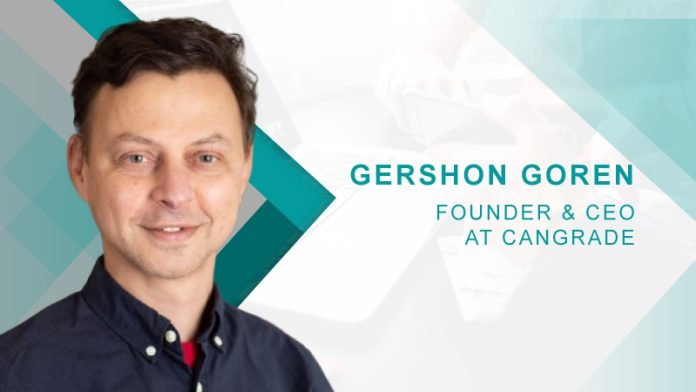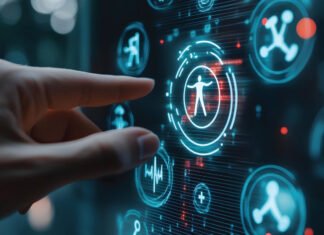Hello Gershon. We are excited to have you onboard. Could you tell us about your background and how Cangrade came into fruition and how the company has grown since its inception?
My background is in software engineering. After the previous company I was involved with got sold to IBM, I had my first opportunity to witness the messiness of a big company’s talent management. So, when I left IBM and met my future co-founder Steve Lehr, who was conducting research at Harvard University that experimented with early AI and Machine Learning technologies in the context of talent data, it immediately resonated with me. The idea of powering the talent management process with unbiased, data-driven insights made a lot of sense to me, so Cangrade was formed.
Nothing was easy about starting a science-focused company in the HCM space. Especially since none of us were HR professionals. Persevering in the face of many setbacks and market inertia has driven our growth. The journey is far from over, but things are accelerating. We’ve transformed from solely a pre-hire assessment solution at our founding to a talent intelligence platform, patented a number of our novel technologies, and just introduced a revolutionary new AI Copilot named Jules that acts as a data-driven personal I/O psychologist for HR teams. There’s a bright future ahead for Cangrade.
How would you define advanced AI implementation in the context of human resources and how do you differ this from basic AI applications?
Advanced AI implementations for HR improve HR processes at a deep, measurable level. They go beyond trivial use cases like writing a job description or an offer letter, ranking candidates based on keywords in their resume, or scheduling or summarizing interviews. They evolve the way HR operates. Today, there aren’t many advanced implementations of AI available to HR because it’s a challenging space for this type of AI. These challenges include:
- Scarcity of consistent, objective, and quantifiable data
- Risk of biases and legal implications
- Pushback from HR professionals
- The noisiness of the market and the plethora of opportunistic fly-by-night solutions
Cangrade is among the few advanced implementations of AI because we address these challenges by focusing on soft skills. Soft skills can be measured fairly reliably, there are a lot of them (we measure 50) which creates a sufficient basis for learning, and soft skills can be cleaned from biases more easily. Not unimportantly, soft skills are also by far the strongest predictor of job success. Our flagship modeling is also based on Predictive AI (as opposed to Generative AI) which is much more reliable and less prone to hallucination.
Could you elaborate, on how AI can contribute to personalized onboarding experiences for new hires and how it helps with engagement and retention?
To better understand how this type of AI can help companies with onboarding new hires, imagine the world where each freshly hired employee comes with a detailed set of instructions describing their biggest strengths and the areas that require development, tied into the specifics of their role and output that they are expected to produce. Moreover, it provides information about the best way to engage them as well as being able to give a manager a well-informed recommendation about any specific question or situation that might arise. You can perhaps compare it to an experienced IO psychologist with a deep knowledge about every employee and available 24/7 to answer any question.
Retention is of course a multifaceted challenge. No AI technology will replace providing work flexibility, treating employees with dignity and respect, and compensating them well. But what AI can do is help find employees who are more likely to be satisfied with the job and give managers great advice on how best to personalize their approach to employees to get them more engaged.
What are the ways that AI can be implemented where it can elevate the HR department to play a more strategic role within the organization?
It is no secret that for decades HR departments were perceived as cost centers without a significant contribution to companies’ bottom lines. Implementing talent management AI will undoubtedly change this perception.
The main reason for companies’ rises and downfalls is the strength of their teams and their cultures. However, traditionally, HR (despite having the word “human” in their name) served merely an administrative role, with most hiring, promoting, and development decisions done by managers. This is changing.
Equipped with highly accurate AI algorithms HR re-takes the lead in managing human-related decisions and they do it while showing a specific and quantifiable impact on the bottom line. This is already a reality, and we have customers whose HR can point to very specific results like sales numbers, customer satisfaction metrics, and retention metrics that they can single-handedly improve with the use of AI-powered employee selection and development tools.
How does the implementation of advanced AI in HR enhance the process of identifying a candidate fit for a certain role? Can you share an example for the same?
HR teams leveraging advanced AI in HR can make the process of identifying a candidate’s fit for a role both more efficient and effective, therefore improving their organization’s performance. It’s important to qualify this answer by stating that every company and every role is unique. Any generic off-the-shelf solution can improve efficiency by predicting fit but is highly unlikely to improve accuracy.
To make hiring more efficient and accurate Cangrade learns from existing teams by collecting metrics and soft skill data to quantify employee success. Then we conduct machine learning to find the link between soft skills and the metrics. This allows us to predict employee success by collecting candidates’ soft skill data using our predictive AI. Our predictive validity (R2 or r-squared) ranges between 45-70%, compared to a job interview’s predictive validity below 10%, and with zero biases.
Having an advanced AI tool for predicting candidate fit allows HR to narrow down the applicant pool from everybody who submitted their job application to a subset of people with a high potential to succeed in this job. Recruiters then can focus their attention on high-potential candidates and generative AI can then help guide their personalized approach to each candidate from an interview to an offer all the way to the onboarding.
What are the ways where AI can facilitate talent mobility within an organization, and how does this benefit the employees and the organization?
These are all very good questions. Solutions like Internal Talent Marketplaces and Candidate Matching tools that leverage AI to predict fit in other open roles throughout the company ease the process of HR identifying internal moves, which in turn can increase the volume of internal moves an organization can make. This improves recruiting efficiency, employee retention and engagement, and builds talent pipelines. This all leads to healthier, higher-performing companies.
Generative AI can make internal role recommendations much more granular and substantive, helping not just HR and managers, but giving guidance directly to the employees. Our Jules AI Copilot can be an incredible professional coach, giving employees highly personalized advice on everything from managing a challenging situation with their manager to preparing for a career move.
Cangrade also has a patented co-scoring technology that enables mobility from the first moment a candidate applies for a job. Even if a candidate may not seem like a good for the job to which they applied, we can immediately identify other opportunities that would lead to a more successful fit and allow HR to offer them to the candidate. This doesn’t just benefit the companies. They are also helpful for candidates and employees. After all, being more successful is engaged with your job is an intrinsic part of anyone’s overall life satisfaction.
Tell us a few tools and technologies that have great potential to enhance the candidate experience during the recruitment process.
There are many things that can be done to make the candidate experience radically better than the highly frustrating and impersonal processes we see today, but I’m not seeing many of them yet.
To better engage candidates and improve their potential employer’s hiring brand Cangrade gives candidates useful feedback from their assessment. It gives them great personalized recommendations on how to best present their strengths, close their skills gaps, and utilize their motivation style for growing their career.
We all, of course, are very familiar with the AI chatbots used for candidate engagement, and this is not the space in which we directly engage. But I definitely see a strong need for the next generation of these tools to truly understand candidate needs while also providing maximum insight to candidates about the employer, company culture, and the job. I strongly believe the employer and the candidate can only gain from being well-informed about each other.
What does it mean to make talent intelligence actionable and personalized, and how can HR implement these in their strategies?
I hope that my previous answers have already outlined some of these strategies, but this question has no silver bullet answer. Understanding what is possible is the first step.
What are certain challenges organizations face when implementing advanced AI solutions in HR, and how do you strategize to overcome these challenges at Cangrade?
One of the main challenges that we continue to experience with customers is the insufficient focus on objective and quantifiable talent management metrics. It sounds almost banal to any of us steeped in data-driven solutions. However, many HR teams still operate with underwhelming objectives. To break away from an administrative status, they need to start looking beyond time-to-hire and interview-to-offer ratio. They need to quantify what makes a good employee. Once this hurdle is tackled, embracing advanced and strategic AI solutions becomes a natural next step.
Give some advice to HR leaders who are looking forward to implementing advanced AI technologies.
Invest in acquiring the necessary internal skills and resources to find out which solution will serve your objectives in the best way possible. Don’t count on vendors, don’t count on consultants. These types of decisions will determine what kind of company you will have for years to come, and this decision lies squarely with you and your team.
Gain Invaluable Insights from HR Tech Leaders. Read Exclusive HrTech Interviews and Discover the Future of Work.

Gershon Goren Founder & CEO, Cangrade
Gershon is an accomplished technologist and entrepreneur. Gershon led the engineering group at Webdialogs, a provider of online meeting and communication solutions acquired by IBM. Following the acquisition Gershon acted as Chief Software Architect in the Lotus group of IBM, delivering LotusLive (now known as IBM SmartCloud) – a cloud-based collaboration suite. After leaving IBM he got involved in a number of different ventures but decided to focus on Cangrade’s mission of leveling the playing field for job seekers. Gershon loves cycling and thinks that the bicycle is the best form of transportation. Gershon holds degrees in CS and Management of Information Systems from Ben Gurion University of Negev, Israel.












